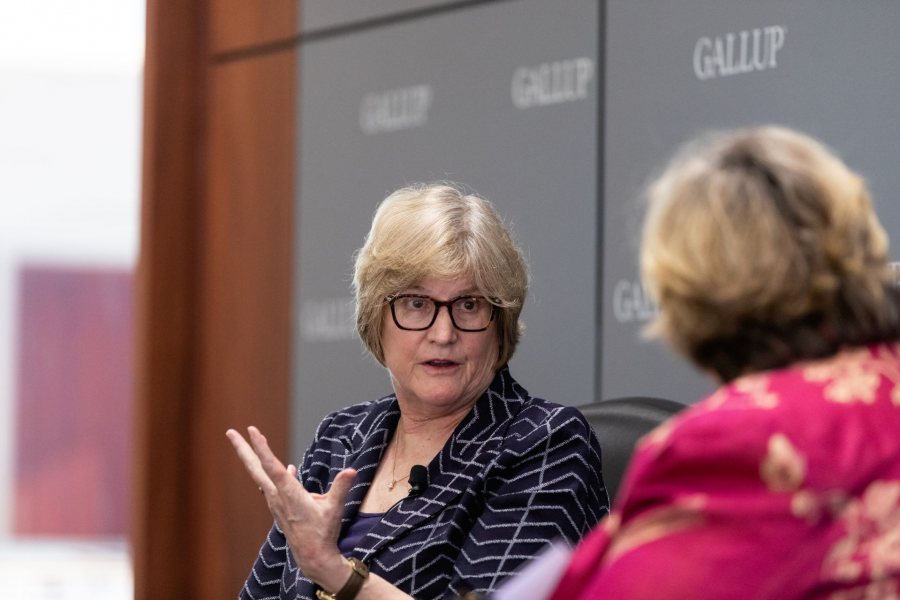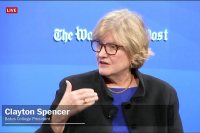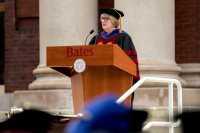
News media coverage tells the compelling story of Purposeful Work at Bates College
Updated June 4, 2019
Attracted by its innovative approach to helping students find work that delivers deep personal meaning and the promise of professional success, news media outlets are telling the compelling story of the Purposeful Work program at Bates College.
April 10, 2019: Media outlets report Bates-Gallup study’s “purpose gap” among college graduates
National media outlets quickly picked up on the April 10 announcement of a Bates-Gallup study exploring the role that purpose plays in the working lives of college graduates.
One of the first stories, by Quartz reporter Jenny Anderson, explained why Bates commissioned the study: to test the founding premise of the college’s Purposeful Work program, specifically, “that happiness and fulfillment” among college graduates “comes in large part from finding meaningful work.”

Bates College President Clayton Spencer speaks with New York Times assistant managing editor Carolyn Ryan ’86 at the announcement of the results of a Bates-Gallup survey examining the role of purpose in college graduates’ working lives. (Photo by Cheriss May)
Specifically, the Gallup study sought to “find out how important meaning was to their work, whether they had found it, and what undergraduate experiences helped most in shaping that meaning.”
As Anderson notes, the study shows that Bates is onto something big: “A whopping 80 percent of college graduates said that it is very important or extremely important to derive a sense of purpose from their work. Less than half had succeeded in finding it. The report…dubs this the ‘purpose gap.'”
Read the stories:
- “The thing that turns a liberal arts education into a meaningful job,” Quartz, April 10, 2019
- “Bates College, Gallup report: Grads want ‘purposeful’ work,” Sun Journal, April 10, 2019
- “What’s the purpose of college?” Forbes, April 10, 2019
- “Purpose as well as paycheck,” Inside Higher Ed, April 11, 2019
Jan. 17, 2019: Washington Post interviews Clayton Spencer about Purposeful Work innovations
Joining a select group of nine U.S. education leaders for an edition of Washington Post Live on Jan. 17, 2019, President Clayton Spencer explained that Bates’ Purposeful Work initiative meets a major — though not always fulfilled — responsibility of a liberal arts college: helping students find jobs that feel meaningful.
“Bates is a classic liberal arts college, but we also recognize and embrace the fact that college has always been about preparing students for life and work,” Spencer said.
Here, President Spencer explains how Purposeful Work helps Bates students align their interests with work that brings them meaning in life:
Sept. 20, 2018: Christian Science Monitor reports how colleges appeal to students with ‘purposeful work’
A story in The Christian Science Monitor says that Bates is leading the way in responding to the challenges facing liberal arts colleges.
Bates’ response, Purposeful Work, focuses on helping students explore career aspirations in ways that feel personally meaningful and also lead to career success.
At Bates, Purposeful Work includes significant investment in internships. James Lee ’19, a biochemistry major from Brooklyn, N.Y., has twice received summer funding through Purposeful Work to further his work interests, specifically to find work that will feel meaningful to him.
The story noted that Lee’s Purposeful Work experience, including summer funding, has successfully helped him discover what he’s interested in: the business and industry sides of the medical field, rather than research.
“When I work in industry, I can see where the research is being applied,” he says. “Sometimes when you’re working in a lab, it’s very easy to lose track of what the bigger picture is. But when you’re working on the front lines, all of the research that you’re doing is applicable.”
Sept. 2, 2018: The Chronicle of Higher Education reports how colleges help students find purpose in their work
A major feature story in The Chronicle of Higher Education on Sept. 2, 2018, concludes that Purposeful Work helps students “clarify the connections between classroom and career” while preparing them “for lives of meaningful work.”
Purposeful Work stands apart for how it “blends the philosophical and the pragmatic.”
Purposeful Work is particularly valuable because it helps to “increase graduates’ confidence that they can succeed in an increasingly technical work force, and to dispel parents’ and policy makers’ doubts about the returns on an expensive liberal-arts degree.”
While many colleges are launching similar programs, Purposeful Work stands apart for how it “blends the philosophical and the pragmatic, offering students both concrete skills and an overarching theory of work: namely, that it ought to have both personal meaning and societal relevance.”
April 29, 2018: Quartz reports how Bates has designed a liberal arts education fit for the future of work
A feature story in Quartz on April 29, 2018, looks at the link between work and happiness, and how Purposeful Work helps students build the latter by finding the former.
With happiness and well-being a challenge to come by in today’s society, Quartz notes, it’s no wonder that many colleges are doubling down on how best to prepare students to find post-graduation happiness.
Bates teaches students “how to figure out the work they want to do” in their work lives — a “key factor in creating happiness.”
The brilliance of what’s happening at Bates under President Clayton Spencer, explains reporter Jenny Anderson, is that it focuses on work.
“If you get love and work right,” Spencer tells Anderson, paraphrasing Sigmund Freud, “you’ve sort of figured it all out.”
In other words, writes Anderson, Bates isn’t just trying to “teach kids how to be happy.” Instead, through Purposeful Work, Bates teaches students “how to figure out the work they want to do” in their work lives — a “key factor in creating happiness.”
Jan. 17, 2018: 12 Lessons on Purposeful Work from Maine Calling
Maine Public’s Maine Calling welcomed a Bates panel to share ideas and insights into the college’s Purposeful Work program.
President Clayton Spencer, Lecturer in Psychology Rebecca Fraser-Thill, and Reed Mszar ’18 talked about how Bates’ Purposeful Work program helps students find what gives them purpose. From their discussion, here are 12 insights about how a sense of purpose in your work helps create well-being in life.
A sense of purpose in one’s work is a powerful force for life satisfaction.
For one, a sense of purpose and well-being in one’s work is a powerful force for life satisfaction. “When people have that purpose or career well-being, that predicts all the others,” Fraser-Thill said.
“If we’re liking what we do every day and we’re doing things we’re good at, we’re more likely to be healthy and have great relationships and feel part of our community and have money.”
June 4, 2018: WGBH-FM reports on new focus on purposeful work at Bates
Boston public radio station WGBH-FM profiled Purposeful Work, a signature Bates program that helps students discover work that aligns with their interests and values.
“We recognize that liberal arts students can do anything.”
The story quoted Peter Bysshe ’93, a Brooklyn-based brand consultant who teaches Practitioner-Taught Courses.
Offered during Short Term as part of the Purposeful Work program, the courses allow students to explore more practical and applied areas of study outside the traditional core liberal arts curriculum.
“We recognize that liberal arts students can do anything,” he said. “We have them do real things so they can feel what it’s like, so it’s not just rhetoric anymore.”
Dec. 11, 2017: MaineBiz reports how Bates prepares students for work that fits their skills and interests
A feature story in MaineBiz praised the college’s Purposeful Work initiative for “helping students discover how ‘work’ — the activity that will fill most of their adult hours — goes far beyond simply collecting a paycheck.”
The story explained how the program weaves questions about work, identity, and purpose into the college’s curriculum and co-curricular programs.
“There is a very natural interest in the program” among donors, said President Spencer.
Funded internships in Maine and worldwide are a strong part of program’s fabric. The story pointed to support from the Portland-based Libra Foundation, whose $250,000 grant to the Bates Campaign will fund more than a dozen annual internships in Maine alone in the coming years.
The program is “looking at the bridge between college and the rest of each student’s life. So there is a very natural interest in the program” among donors, said President Spencer.




